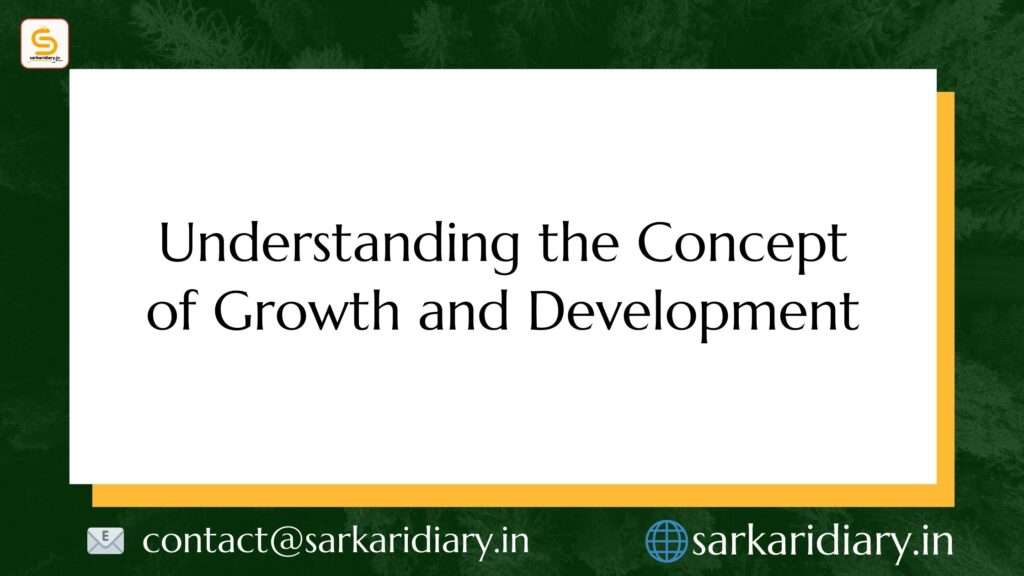Significance of Growth and Development
Growth and development are fundamental aspects of human life. They encompass the physical, cognitive, emotional, and social changes that individuals experience throughout their lifespan. Psychologists have long been intrigued by the concept of growth and development, seeking to understand the underlying processes and factors that contribute to human maturation.
👉 Click Here to Visit B.Ed Notes Page

Defining Growth and Development
Growth refers to the physical changes that occur in an individual’s body, including height, weight, and motor skills. On the other hand, development encompasses the psychological and behavioral changes that occur as individuals mature.
Psychologists often use the terms growth and development interchangeably, recognizing that they are closely intertwined. Both processes are influenced by a combination of genetic, environmental, and cultural factors.
Theories of Growth and Development
Over the years, psychologists have proposed various theories to explain the patterns and stages of human growth and development. These theories provide frameworks for understanding how individuals change and develop over time.
————————–
👉 Click for B.ED Semester 1 Notes
👉 Click for B.ED Semester 2 Notes
👉 Click for B.ED Semester 3 Notes
👉 Click for B.ED Semester 4 Notes
👉 Visit Our Sarkari Diary Notes Section
————————–
1. Piaget’s Cognitive Development Theory
Jean Piaget, a renowned Swiss psychologist, proposed a theory of cognitive development that highlights how individuals acquire knowledge and understanding. According to Piaget, individuals progress through four stages of cognitive development: sensorimotor, preoperational, concrete operational, and formal operational.
Also Read: [catlist name=bed-deled]
2. Erikson’s Psychosocial Development Theory
Erik Erikson, a prominent developmental psychologist, proposed a psychosocial development theory that emphasizes the importance of social interactions and relationships in shaping an individual’s development. Erikson identified eight stages of psychosocial development, each characterized by a unique developmental task or crisis.
3. Maslow’s Hierarchy of Needs
Abraham Maslow, a humanistic psychologist, introduced the concept of a hierarchy of needs, which suggests that individuals must fulfill basic physiological and safety needs before progressing to higher-level needs such as love, belonging, esteem, and self-actualization.
Factors Influencing Growth and Development
Several factors contribute to an individual’s growth and development:
Genetics: Genetic factors play a significant role in determining physical characteristics and potential developmental outcomes.
Environment: The environment in which an individual grows up influences their development, including access to resources, quality of education, and exposure to various experiences.
Parenting Style: The parenting style adopted by caregivers can shape a child’s development, affecting their self-esteem, social skills, and overall well-being.
Peer Influence: Interactions with peers can impact an individual’s social development, including the formation of friendships, the development of social skills, and the adoption of certain behaviors.
The Importance of Understanding Growth and Development
Understanding the concept of growth and development is crucial for various professionals, including educators, healthcare providers, and psychologists. By recognizing the factors that influence human development, these professionals can tailor their approaches to better support individuals at different stages of life.
Conclusion
The concept of growth and development is multifaceted, encompassing physical, cognitive, emotional, and social changes that occur throughout an individual’s lifespan. Psychologists have proposed various theories to explain the patterns and stages of human development, highlighting the role of genetics, environment, parenting style, and peer influence. By gaining a deeper understanding of growth and development, professionals can contribute to the well-being and success of individuals across different life stages.